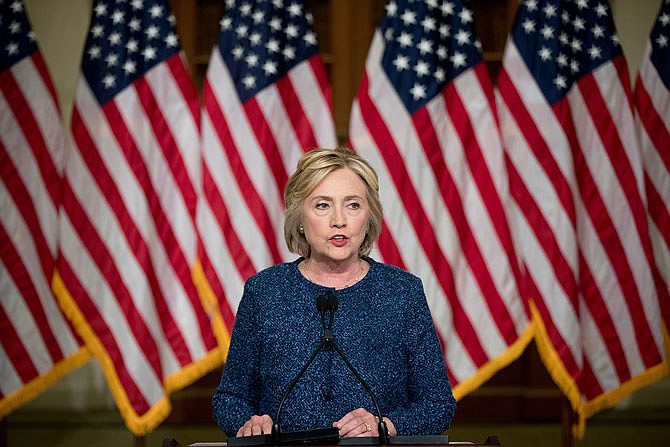WHITE PLAINS, N.Y. (AP) - The White House was submerged in scandal. Democrats faced tough midterm elections. And Hillary Clinton, far more popular than her embattled husband, had become a one-woman campaign machine.
But the nonstop travel in 1998 took a toll. Clinton developed a blood clot behind her right knee, prompting the White House doctor to recommend hospitalization and a week of bedrest.
Determined to stay on the campaign trail, Clinton settled on an alternative: A nurse would travel with her to administer the medicine needed to monitor her health. She kept her condition a secret from nearly everyone but her Secret Service detail, alerted only because an injury could have been life-threatening.
"Very few people knew about it at the time," recalled Dr. Connie Mariano in her autobiography. "Her staff thought she had pulled a muscle exercising."
Nearly two decades later, Clinton's desire to work through illness - and penchant for keeping her health secret - has helped cause the most damaging 48-hour period in her presidential campaign and given fresh ammunition to GOP rival Donald Trump. The incident has also stoked long-simmering conservative conspiracy theories about her health and questions about her commitment to openness.
Video of her staggering and stumbling at a 9/11 ceremony on Sunday and her controversial comments about Trump's supporters at a Friday fundraiser both occurred while she suffered from lingering pneumonia.
At least part of the blame goes to a simple cause: Clinton's stubborn unwillingness to follow the advice of doctors, family and friends.
"This is just who she is. She is a workhorse. No matter who tells her, her husband can tell her. It doesn't matter. Chelsea can tell her," said Virginia Gov. Terry McAuliffe, a Democrat who served as chairman of her 2008 presidential campaign. "You're not going to change her at this point in her life."
After her Friday pneumonia diagnosis, Clinton was determined to "power through," she told CNN late Monday.
The public and most in her campaign were kept in the dark. Her running mate, Virginia Sen. Tim Kaine, and her campaign manager, Robby Mook, declined to say when they first learned about her condition.
The decision to keep going was one Clinton, who suffers seasonal allergies that can become a vicious cough, came to regret. The Democrat is now taking a few days off the campaign trail, forced to the sidelines at a critical point in the fall election.
Campaign spokesman Nick Merrill said the Democratic nominee spent Tuesday reading briefing material, calling aides and watching President Barack Obama campaign on her behalf in Philadelphia. She will resume campaign travel on Thursday, he said.
But the incident follows a long pattern, with Clinton paying a price, both physically and politically.
During the waning days of her time as secretary of state, she sustained a concussion in a fainting episode at her home, which her doctor later attributed to dehydration and a stomach virus she developed during a trip to Europe. In follow-up evaluations, Clinton was found to have a blood clot in a vein in the space between her brain and the skull behind her right ear.
To recover, she spent a few days at a hospital and took a month-long absence from the State Department for treatment. Her physician, Dr. Lisa Bardack, said in 2013 that testing showed "complete resolution" of the concussion's effects.
But the episode became a central part of a political rumor about her health that has only grown more damaging as her presidential campaign has continued. Trump has seized on those concerns, often questioning Clinton's stamina and energy.

